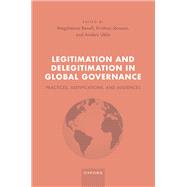This is an open access title available under the terms of a CC BY-NC-ND 4.0 International licence. It is free to read at Oxford Scholarship Online and offered as a free PDF download from OUP and selected open access locations.
The legitimacy of global governance institutions is both contested and defended in contemporary global politics. Legitimation and Delegitimation in Global Governance explores processes of legitimation and delegitimation of such institutions. How, why, and with what impact on audiences, are global governance institutions legitimated and delegitimated? The book develops a comprehensive theoretical framework for studying processes of (de)legitimation in governance beyond the state. It provides broad comparative analyses to uncover previously unexplored patterns of (de)legitimation processes. A diverse set of global and regional governmental and nongovernmental institutions in different policy fields are included. Variation across these institutions is explained with reference to institutional set-up, policy field characteristics, and broader social structures, as well as to the qualities of agents of (de)legitimation. The approach builds on a mixed-methods research design that uses quantitative and qualitative new empirical data. Three main interlinked elements of processes of legitimation and delegitimation are at the center of the analysis: the varied practices employed by different agents that may boost or challenge the legitimacy of institutions; the normative justifications that these agents draw on when engaging in legitimation and delegitimation practices; and the different audiences that may be impacted by legitimation and delegitimation. This results in a dynamic interplay between legitimation and delegitimation in contestation over the legitimacy of GGIs.








